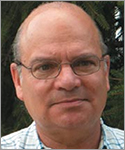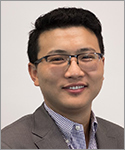 Carl Wagner Memorial Award
Carl Wagner Memorial Award
Tuesday 1140h | Room 311
Mathematical Modeling of Electrochemical Systems
by John W. Weidner
John W. Weidner is dean of the College of Engineering and Applied Sciences at the University of Cincinnati. Prior to being appointed dean in August of 2019, he was a professor of chemical engineering at the University of South Carolina. He received his BS in chemical engineering from the University of Wisconsin–Madison in 1986 and his PhD in chemical engineering from North Carolina State University under the direction of Dr. Peter S. Fedkiw in 1991. That same year he joined the University of South Carolina as an assistant professor as part of the university’s Center for Electrochemical Engineering.
In the summer of 1992, he worked with Gerald Halpert as a NASA Summer Faculty Fellow in the Energy Storage Systems Group at the Jet Propulsion Laboratory in Pasadena, modeling nickel batteries. In the fall of 1999, he spent a sabbatical at the University of California–Berkeley working with John Newman, again studying the nickel electrode. In the spring of 2000, he worked with Tom Zawodzinski at Los Alamos National Laboratory, modeling impedance in porous electrodes. He spent his next sabbatical, from 2007 to 2008, at the Fraunhofer Institute for Solar Energy Systems in Freiburg, Germany, developing advanced catalysts for proton exchange membrane (PEM) electrolyzers for Christopher Hebling’s hydrogen technology group.
Weidner has published 113 refereed journal articles and contributed to over 200 technical presentations in the field of electrochemical engineering. His research group has created novel synthesis routines for battery materials and electrocatalysts, and has used a variety of electroanalytical techniques and developed sophisticated mathematical models to advance the fields of electrochemical reactors, advanced batteries, electrochemical capacitors, fuel cells, and electrolyzers.
As a graduate student, Weidner received an ECS Energy Research Summer Fellowship and the ECS Battery Division Student Research Award for his dissertation work on the nickel electrode. In 2010, he received the ECS Energy Technology Division Research Award for his work on his patented PEM electrolyzer for the large-scale production of hydrogen from gaseous SO2 as part of the hybrid sulfur process.
Weidner has been active in ECS for over 30 years, including as past chair of the Industrial Electrochemistry and Electrochemical Engineering (IE&EE) Division and as a member-at-large of the IE&EE, Energy Technology, and Battery Divisions. He currently serves on the Interface Advisory Board. He was the inaugural editor of ECS Transactions and technical editor for the electrochemical engineering topical interest area for the Journal of The Electrochemical Society. He is a fellow of ECS and the American Institute of Chemical Engineers (AIChE).
 Olin Palladium Award
Olin Palladium Award
Wednesday 1640h | Galleria 2
Polymer Electrolyte Fuel Cells: Recognition of a Field of Electrochemistry for Technical Contributions Made by Outstanding Technical Teams
by Shimshon Gottesfeld
Shimshon Gottesfeld obtained his DSc in chemistry in 1970 from the Technion – Israel Institute of Technology in Haifa, Israel, and joined the staff of the Department of Chemistry at the University of Tel Aviv in 1972. He spent an extended sabbatical leave between 1977 and 1979 at Bell Labs in Murray Hill, New Jersey.
In 1984, he came to Los Alamos National Laboratory (LANL) on sabbatical leave, and in 1987, he became the technical project leader for the LANL Fuel Cell Research Project. Gottesfeld also initiated and directed LANL R&D work on ultracapacitors. In 1999, Gottesfeld was appointed Laboratory Fellow at LANL.
Gottesfeld has published over 150 articles and several book chapters and holds 40 patents, with 10 more pending. He served as officer and chair of the division formerly known as the ECS Physical Electrochemistry Division (now known as the ECS Physical and Analytical Electrochemistry Division).
Gottesfeld was selected in 1999 to be an ECS fellow. During the same year, he co-initiated the series of Gordon Research Conferences on Fuel Cells.
Gottesfeld is the 2006 recipient of the Grove Medal for Fuel Cell Science and Technology.
In 2014, he received the George Schuit Lectureship Award from the Catalysis Center at the University of Delaware.
In 2007, he co-initiated a new start-up, Cellera (Israel), targeting the development of hydroxide conducting membrane fuel cells (HEMFCs).
In 2015, Gottesfeld was nominated adjunct professor at the Department of Chemical Engineering of the University of Delaware.
A symposium honoring his work took place at the 235th ECS Meeting, where he was presented with a Recognition Award by the U.S. DOE.
 Norman Hackerman Young Author Award
Norman Hackerman Young Author Award
Jan Schwämmlein received his BSc and MSc in chemistry and is a PhD candidate at the Chair of Technical Electrochemistry at the Technical University of Munich.
As a graduate student, Schwämmlein worked with Hubert Gasteiger on low-temperature fuel cells, both in acidic and alkaline environments. During this time, he was able to contribute to a better understanding of the mechanism of the hydrogen oxidation reaction on bimetallic Pt-Ru catalysts via kinetic measurements on core-shell nanoparticles. Furthermore, he investigated the degradation of the anode electrode in proton exchange membrane fuel cells (PEMFCs) during start-up/shut-down events. Also, the contribution of the oxygen transport resistance and the performance degradation during accelerated stress tests was studied by a full voltage loss analysis of PEMFCs. This analysis was then transferred to novel catalysts based on Pt-Y alloys for the oxygen reduction reaction. In total, Schwämmlein has authored six publications and contributed to several other papers as a coauthor.
Since the beginning of 2019, Schwämmlein has worked as a development engineer at Mercedes-Benz Fuel Cell GmbH.
 Bruce Deal & Andy Grove Young Author Award
Bruce Deal & Andy Grove Young Author Award
Jiancheng Yang received his BS in chemical engineering from the University of Delaware in 2015. The following year, he received his MEng in particle technology. In the fall of 2016, Yang accepted a fellowship to pursue a PhD program in chemical engineering at the University of Florida. He joined Fan Ren’s research group to further explore and develop his research skills and interests. Yang’s primary research has focused largely on the development of vertical rectifiers using Ga2O3 wide bandgap semiconductor material for power electronics applications. He has published over 40 technical journal papers and received the Graduate Research Award from the American Vacuum Society in the fall of 2018. Yang graduated in May 2019 with a PhD in chemical engineering. He now works in the private sector as a process engineer at Key¬sight Technologies, a world-leading electronics test and measurement equipment company.





